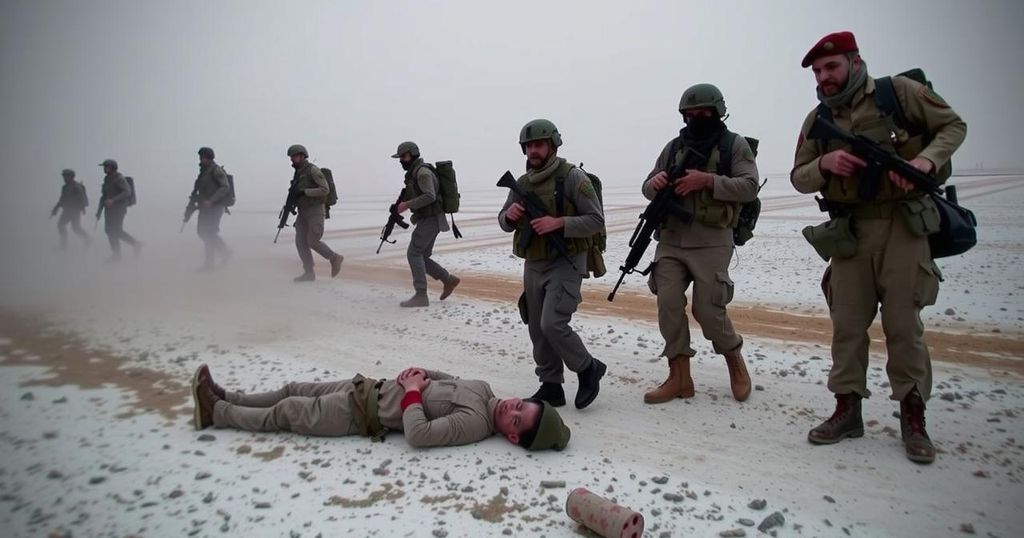Global news
AFGHANISTAN, AFRICA, AGENCE FRANCE - PRESSE, ASIA, BARMAL, CONFLICT, GHANA, ISLAMABAD, ISLAMIC EMIRATE, MILITANT ATTACK, MILITARY OPERATIONS, MU, MUJAHID, PAKISTAN, PAKTIKA, SOUTH WAZIRISTAN, TALIBAN, TEHRIK - I - TALIBAN PAKISTAN, TERRORISM, TTP, WA, ZA, ZABIHULLAH MUJAHID
Isaac Bennett
0 Comments
Taliban Claims Pakistani Airstrikes Result in Civilian Casualties in Afghanistan
Taliban officials allege that a Pakistani airstrike in Barmal, Paktika, killed 46 people, mostly women and children. Pakistani security sources claim the strikes targeted TTP insurgent positions. The Afghan government condemned the actions as barbaric and a violation of international law, while emphasizing that Afghanistan does not support the TTP. The incident follows a significant attack on Pakistani soldiers by the TTP, exacerbating regional tensions.
Taliban officials have reported that an alleged Pakistani airstrike in Afghanistan resulted in the deaths of at least 46 individuals, predominantly women and children, in the eastern region of Paktika. Zabihullah Mujahid, the spokesperson for the Taliban government, indicated that the bombing targeted four specific locations in the Barmal district during the night on Tuesday. In addition, he mentioned that six civilians sustained injuries, yet independent verification of these claims remains unconfirmed.
While the Pakistani government has not responded directly to these allegations, anonymous Pakistani security officials suggested that their military had conducted precision airstrikes in Barmal aimed at insurgent positions tied to the Tehrik-i-Taliban Pakistan (TTP). Pakistan asserts that this group is responsible for orchestrating attacks on its soil from bases within Afghanistan. Consequently, the Afghan Ministry of National Defense condemned the strikes as a barbaric act and a violation of international law, stating that both Afghan citizens and Pakistani refugees were victims of the attack.
The Afghan Ministry expressed that this bombing represents a breach of international principles. It further asserted that the Taliban government does not support the TTP or other foreign extremist factions, viewing the violence within Pakistan as an internal issue that Islamabad must resolve without attributing blame to Kabul. Notably, this incident occurred shortly after the TTP executed a significant assault on a security outpost in South Waziristan, resulting in the deaths of 16 Pakistani soldiers and coinciding with resumed high-level meetings between Taliban leaders and Pakistani officials after a year of suspended dialogue due to ongoing security concerns.
The context surrounding these events involves ongoing tensions along the Afghanistan-Pakistan border, where accusations of cross-border incursions and terrorism have heightened friction. The situation illustrates the complexities of security and bilateral relations amid rising insurgent threats, with both nations navigating the challenges posed by militant groups operating in their respective territories.
The longstanding conflict between Afghanistan and Pakistan has been fueled by the presence of militant groups, particularly the Tehrik-i-Taliban Pakistan (TTP), which operates from bases within Afghanistan. Islamabad accuses these groups of conducting attacks against Pakistani forces, while Afghanistan, under Taliban rule, insists it neither supports nor harbors insurgent factions. The dynamics of this relationship have fluctuated over the years, often hinging on security, sovereignty, and external pressures from international actors. The recent allegations of an airstrike underscore the volatile nature of this border region and highlight the potential consequences of unresolved hostility and militaristic strategies.
In summary, the reported airstrike attributed to Pakistani forces raises significant concerns regarding civilian casualties and the ongoing tensions between Afghanistan and Pakistan. The Taliban’s allegations, coupled with the Afghan Ministry of National Defense’s denunciation of the strikes, reflect a broader struggle over regional security and the influence of militant groups. With continued military actions and accusations, both nations face substantial challenges in addressing border security and containing insurgent threats without escalating conflicts further.
Original Source: www.voanews.com




Post Comment